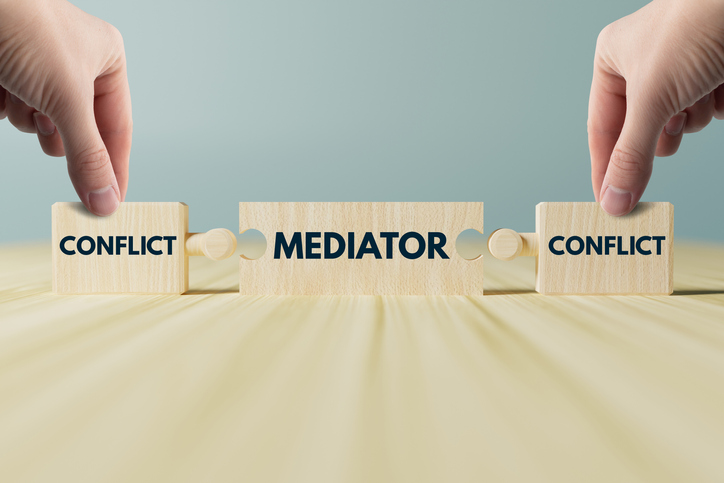Family Mediation Week
As part of Family Mediation Week, our Senior Associate and Mediator, Madeleine Young sets out different ways of mediating family disputes and gives her 5 top tips for successful mediation
Over the last few years, the way in which family mediation has developed in the UK now gives separating families many more choices in terms of resolving issues arising from separation.
Traditional mediation/co-mediation
Up until around 4 years ago, almost all mediation was conducted between a mediator and the separating couple, in person. Traditional mediation remains the starting point for many couples who are separating, and can be an extremely effective form of dispute resolution. Prior to commencing mediation proper, it is commonplace for each party to have a screening session with the mediator by themselves, during which the mediator will assess any potential risks or particular issues which will need managing.
In cases where there may be particularly complex issues to address, whether practically or emotionally, a co-mediator can be brought in. Having two mediators, rather than one, changes the dynamics of the sessions, and can be very constructive when tensions remain high.
With the global Covid pandemic in 2020 many mediators started offering their services virtually. Whilst the general thinking is that “in person” is more effective, remote mediation proved to be more successful than originally thought, and remains an option for many today.
Shuttle mediation and Hybrid mediation
In situations where the parties to mediation do not feel able to have an in person session with their former partner present, mediators have historically offered “shuttle” mediation. Sometimes one, or both, parties will either feel an imbalance in negotiating power when faced with their former partner, or perhaps emotions are still too raw and overwhelming. In shuttle mediation, the parties will be in separate rooms, and the mediator will shuttle between them. Naturally, this process will take longer than traditional in person mediation. The mediator will relay each party’s position to the other, and facilitate negotiations by exploring possible options with each party.
Legal representatives can also be involved in shuttle mediation, which can give the parties the confidence to negotiate with legal advice on hand.
2020 saw the launch of “hybrid” mediation in the UK, enabling the parties to involve their lawyers and other relevant professionals in the mediation process. It is called hybrid mediation because it is a hybrid between traditional family mediation, and civil mediation.
Hybrid mediation can be particularly effective when there are certain safeguarding issues, where one person does not feel comfortable being in the same room or same Zoom screen as the other, or when there is very high conflict. It enables each person to explore options with the mediator in great detail without feeling they have over-committed, and assists the mediator in being able to guide the parties to a more satisfactory compromise.
Other professionals, whether the parties’ lawyers, financial advisors, or counsellors (to name but a few) are able to use their skills, knowledge and solutions to make the whole process better informed and more likely to achieve workable, fair settlements.
Hybrid mediators have undertaken specialist training with Resolution to enable them to utilize both family and civil mediation techniques and procedures. The training enables a hybrid mediator to be more flexible and innovative with the participants.
Child Inclusive mediation
Mediators able to offer child inclusive mediation are specially trained in consulting with children. The purpose of child inclusive mediation is not to obtain a child’s wishes and feelings in a legal sense, but is an opportunity for children to tell the professionals helping their parents what they want them to know or consider while decisions are being made that affect them.
Child inclusive mediation does not involve the children attending mediation sessions with their parents. The mediator will meet with the child/children in private, and the contents of the discussions is confidential, save for any safeguarding concerns which might arise. The mediator will agree with the children what information may be passed back to their parents.
The mediator mediating between the parents may also be a child inclusive mediator who can meet with the children and then feed back to the parents. Alternatively, an independent child inclusive mediator can meet the children, and then attend a mediation session with the parents and their mediator to pass back information from the children.
s.5.7.2 of the Family Mediation Council Code of Practice states:
“All children and young people aged 10 and above should be offered the opportunity to have their voices heard directly during the Mediation, if they wish.”
The FMC also suggests that ‘child-inclusive mediation provides opportunities for children and young people to have their voices heard directly during the process of mediation, to help them feel respected and listened to and, at their request, to assist parents or carers to receive, understand and take account of the child’s messages and/or suggestions regarding decisions and arrangements for the child.’
Top Tips for successful mediation
- Choose your mediation process carefully – consider which of the various mediation “models” is likely to be most beneficial for you and your former partner. If either of you finds being in the same room as the other too emotionally upsetting, that is likely to be an obstacle to being able to reach a consensus, and it may be that shuttle or hybrid mediation is appropriate.
- Be prepared – both emotionally and physically. Make sure you have enough time to get to the mediation venue, know where it is and what your travel arrangements are. There is nothing worse than rushing and feeling out of control. Be aware that mediation might bring up emotions that you had thought were dead and buried. There are fabulous coaches and counsellors who are able to help you prepare mentally for mediation, putting you in the best frame of mind for constructive meetings.
- Come with an open mind – mediation is confidential, and “without prejudice”, meaning it cannot be referred to in Court proceedings. Be prepared to explore options that might not initially be attractive to you. Seek compromise, not judgement. Creative and unusual solutions can be found if both parties are willing to openly discuss any potential outcomes.
- Do your homework – if you are dealing with a financial settlement, organise your documents, and provide them to the mediator within the agreed time frame. If your mediator has asked you to research particular information, that is because it will be helpful to your discussions.
- Take Legal Advice – taking legal advice in between mediation sessions can be invaluable, as it will help you understand the implications of various outcomes, and help guide your discussions within mediation.
The above is merely a snapshot of some ways in which mediation can be tailored to separating couples and their families to meet their needs.
In the landscape where court proceedings can take months, if not years, to conclude, and can cost many thousands of pounds, mediation is a robust and constructive dispute resolution process. We may be a way off mediation being made compulsory for separating couples, but it is an option that deserves serious consideration.
Should you require any advice or assistance in relation to mediation, or family law issues generally, please do not hesitate to contact Madeleine Young

